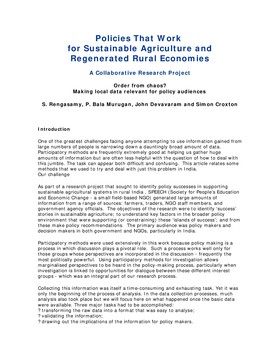Policies That Work for Sustainable Agriculture and Regenerated Rural Economies. Order from chaos? Making local data relevant for policy audiences

One of the greatest challenges facing anyone attempting to use information gained from large numbers of people is narrowing down a dauntingly broad amount of data. Participatory methods are frequently extremely good at helping us gather huge amounts of information but are often less helpful with the question of how to deal with this jumble. The task can appear both difficult and confusing. This article relates some methods that we used to try and deal with just this problem in India. Our challenge As part of a research project that sought to identify policy successes in supporting sustainable agricultural systems in rural India , SPEECH (Society for People's Education and Economic Change - a small field-based NGO) generated large amounts of information from a range of sources: farmers, traders, NGO staff members, and government agency officials.
Cite this publication
Available at https://www.iied.org/g01287